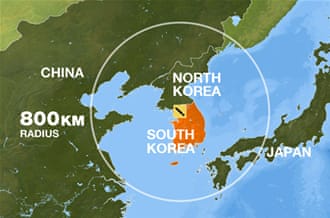Sunday’s move to significantly boost the South's missile capabilities is likely to rattle North Korea which has remained at odds since the 1950-53 Korean War left the peninsula divided.
It may also stoke concern in China, Japan and Russia, parts of which would be within range of the new missiles.
Under the agreement, South Korea can develop missiles up to a range of 800 km from the current ceiling of 300 km, Chun Young-woo, top secretary to President Lee Myung-bak for foreign and security affairs, told reporters.
 |
| Under the new deal South Korea can develop missiles up to a range of 800 km from the current ceiling of 300 km |
He said the United States and South Korea also agreed to maintain the maximum payload for a South Korean-developed ballistic missile at the current level of 500 kilograms.
However, if Seoul chose to develop a missile with shorter ranges, it could increase the payload accordingly.
Seoul has for years sought to extend its missile range to deter the North, which it said had developed missiles that could reach every corner of the country.
"The most important goal for our government to revise the missile guidelines is deterring North Korea's military provocations," Chun said.
Currently, all of South Korea as well as US military installations in Japan and Guam, are within the range of North Korean missile attacks, according to South Korean government data.
In April, North Korea was condemned by the UN Security Council after a failed long-range rocket launch.
US allies including South Korea deemed it a disguised test for the North to upgrade its ballistic missile technology despite Pyongyang's claim that it was aimed to put a satellite into orbit for peaceful purpose.
Washington had sought to discourage South Korea from developing longer-range ballistic missiles in keeping with a voluntary international arms-control pact known as the Missile Technology Control Regime (MTCR).
(posted by Anthony D)
I find it really interesting that the US was willing to back South Korea in furthering its weapons development. However, with North Korea being such an imminent threat I suppose it was inevitable. What kind of reaction do you think will come from China and North Korea and even Russia? Japan, although probably concerned about the range of the missiles, is on fine terms with South Korea; but as for countries like North Korea and its "big brother" China, do you think they will further retaliate? -Cecilia G
ReplyDeleteI'm sure China was expecting this. With them backing North Korea and their nuclear program, it's natural for the United States to support South Korea and its program. Because North Korea already has the ability to strike South Korea with atomic missiles, this sounds like a more defensive measure, and thus should not be met with a huge reaction. Now South Korea can and should defend themselves from North Korea, if ever they should become a dire threat. -Mae Markowski
ReplyDeleteSince South Korea is surrounded by nations such as North Korea and China it only would make sense for them to have a nuclear program. It seems as if the program is more for self-defence so China and North Korea should not have a high concern.(sara k.)
ReplyDeleteI think it was inevitable that the U.S. would develop a missile deal with South Korea. China is backing North Korea and their nuclear program, why shouldn't the U.S. back South Korea? It's like leveling the playing field, China backs North Korea, and the U.S. backs South Korea[Kylen H.].
ReplyDeleteSouth and North Korea are still wrapped up in the idea of a proxy war; I think both the United States and China want to prove their power, but neither of them want to go to all out war. It's a chess game to outwit each other.
ReplyDelete(Rachel B)